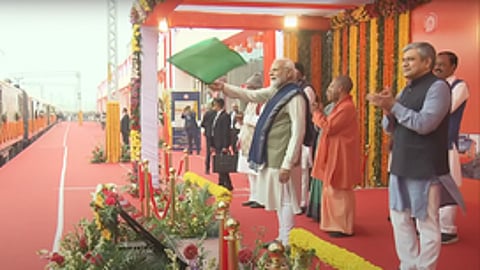

Prime Minister Narendra Modi on Saturday, December 30, inaugurated the Ayodhya Dham railway station. The Prime Minister who arrived in Uttar Pradesh was received by Chief Minister Yogi Adityanath and Governor Anandiben Patel at the airport.
The Prime Minister held a roadshow while enroute to the railway station. Thousands of people had lined up along the route, showering rose petals on the convoy and cheering the Prime Minister. Devotional songs dedicated to Lord Ram were being played out on the streets in the town as school children put up dance performances.
The Prime Minister flagged off the new trains from the railway stations which included two Amrit Bharat trains and six Vande Bharat trains. Later, the Prime Minister will also inaugurate the newly-built airport and will lay the foundation stones for a slew of development projects in Uttar Pradesh.
Meanwhile, the city has been decked up with flowers, murals, and thematic ornamental columns amid heavy security deployment. Huge posters with images of Modi have been put up at prominent locations here, while cut-outs of Lord Ram have been installed outside the redeveloped railway station.
This visit by the Prime Minister comes just ahead of the 'pran pratishtha' or consecration ceremony of the Ram Mandir on January 22.
Babri Masjid, built by Mir Baqi, commander of Mughal emperor Babur in 1528, was demolished by kar sevaks belonging to Hindu majoritarian outfits on December 6, 1992. The demolition, which happened as a result of a concerted Ram Janmabhoomi movement, resulted in communal riots over months, which led to over 2,000 deaths. The Babri Masjid has been a contested site since 1885 as religious leaders and Hindutva outfits considered it Ram Janambhoomi or the birthplace of Lord Ram in Ayodhya.
A legal fight ensued in 1950 when Gopal Visharad Sharma approached Faizabad district court for the right to worship idols of Ram Lalla, which were placed there in 1949. On September 30, 2010, the High Court, in a 2:1 majority, ruled a three-way division of the disputed area between the Sunni Waqf Board, the Nirmohi Akhara and Ram Lalla.
Nine years later, in 2019, the Supreme Court granted the entire 2.77 acres of disputed land to deity Ram Lalla and directed the Uttar Pradesh government to allot five acres of land to Muslims for building a mosque. Though the Supreme Court referred to the mosque's demolition as "an egregious violation of the rule of law," the verdict was criticised for accepting the logic of "faith over fact" and granting legal possession of land to those responsible for the demolition.